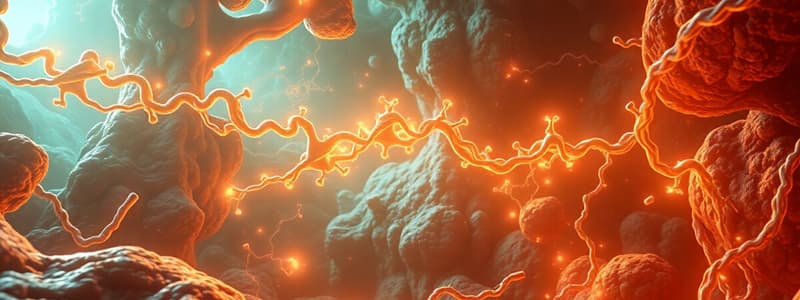Podcast
Questions and Answers
What is the primary regulation point of the pentose phosphate pathway?
What is the primary regulation point of the pentose phosphate pathway?
- Transaldolase reaction
- Ribulose 5-phosphate isomerase
- Glucose 6-phosphate dehydrogenase reaction (correct)
- Fructose 1,6-bisphosphate
What role does insulin play in the regulation of the pentose phosphate pathway?
What role does insulin play in the regulation of the pentose phosphate pathway?
- It has no effect on G6PD expression.
- It up regulates the expression of G6PD. (correct)
- It inhibits the expression of G6PD.
- It down regulates G6PD in fasted states.
What is a major consequence of G6PD deficiency?
What is a major consequence of G6PD deficiency?
- Increased detoxification of oxidizing agents
- Increased resistance to bacterial infections
- Enhanced formation of NADPH
- Hemolytic anemia (correct)
How is G6PD deficiency inherited?
How is G6PD deficiency inherited?
What is a common clinical manifestation of G6PD deficiency in newborns?
What is a common clinical manifestation of G6PD deficiency in newborns?
What evolutionary advantage is associated with G6PD deficiency?
What evolutionary advantage is associated with G6PD deficiency?
What must be balanced against the risks of hemolytic anemia in G6PD deficiency?
What must be balanced against the risks of hemolytic anemia in G6PD deficiency?
What is a primary outcome of the pentose phosphate pathway?
What is a primary outcome of the pentose phosphate pathway?
Which cell types are particularly active in NADPH-dependent fatty acid biosynthesis?
Which cell types are particularly active in NADPH-dependent fatty acid biosynthesis?
What does glucose 6-phosphate dehydrogenase (G6PD) perform in the pentose phosphate pathway?
What does glucose 6-phosphate dehydrogenase (G6PD) perform in the pentose phosphate pathway?
Which of the following compounds is produced in the oxidative phase of the pentose phosphate pathway?
Which of the following compounds is produced in the oxidative phase of the pentose phosphate pathway?
What type of reactions occur in the non-oxidative phase of the pentose phosphate pathway?
What type of reactions occur in the non-oxidative phase of the pentose phosphate pathway?
Which biochemical role does NADPH serve in the body?
Which biochemical role does NADPH serve in the body?
Glucose 6-phosphate dehydrogenase deficiency can lead to which of the following consequences?
Glucose 6-phosphate dehydrogenase deficiency can lead to which of the following consequences?
In which organ is the pentose phosphate pathway particularly crucial for synthesizing steroid hormones?
In which organ is the pentose phosphate pathway particularly crucial for synthesizing steroid hormones?
Flashcards
Pentose Phosphate Pathway
Pentose Phosphate Pathway
A metabolic pathway that generates NADPH and ribose 5-phosphate, important for biosynthesis and reducing power.
NADPH function
NADPH function
Acts as a biochemical reductant, crucial for biosynthesis, especially fatty acids and steroid hormones.
Ribose 5-phosphate
Ribose 5-phosphate
A crucial component needed for nucleotide biosynthesis.
Glucose 6-Phosphate Dehydrogenase (G6PD)
Glucose 6-Phosphate Dehydrogenase (G6PD)
Signup and view all the flashcards
Glucose 6-phosphate deficiency effect
Glucose 6-phosphate deficiency effect
Signup and view all the flashcards
NADPH importance in RBCs
NADPH importance in RBCs
Signup and view all the flashcards
Irreversible reactions in Pentose Phosphate Pathway
Irreversible reactions in Pentose Phosphate Pathway
Signup and view all the flashcards
Pentose phosphate pathway site
Pentose phosphate pathway site
Signup and view all the flashcards
Pentose Phosphate Pathway Regulation
Pentose Phosphate Pathway Regulation
Signup and view all the flashcards
G6PD Deficiency
G6PD Deficiency
Signup and view all the flashcards
G6PD Deficiency Cause
G6PD Deficiency Cause
Signup and view all the flashcards
G6PD Deficiency Symptoms
G6PD Deficiency Symptoms
Signup and view all the flashcards
G6PD Deficiency's Impact
G6PD Deficiency's Impact
Signup and view all the flashcards
Glucose-6-Phosphate Dehydrogenase (G6PD)
Glucose-6-Phosphate Dehydrogenase (G6PD)
Signup and view all the flashcards
NADPH role in RBCs
NADPH role in RBCs
Signup and view all the flashcards
Study Notes
Pentose Phosphate Pathway
- The pentose phosphate pathway, also called the hexose monophosphate pathway or 6-phosphogluconate pathway, occurs in the cytosol of cells.
- The pathway involves two, irreversible oxidative reactions, followed by reversible sugar-phosphate interconversions.
- The pathway does not directly consume or produce ATP.
Specific Objectives
- Understand the function of the pentose shunt.
- Explain the effect of glucose 6-P dehydrogenase deficiency.
Overview of Pentose Phosphate Pathway
- The pathway provides the body with NADPH, a crucial biochemical reductant.
- It produces ribose-5-phosphate needed for nucleotide biosynthesis.
- It helps metabolize five-carbon sugars from the diet or carbohydrates in the body.
Irreversible Oxidative Reactions
- The production of ribulose 5-phosphate, CO2, and two molecules of NADPH occur for each molecule of glucose 6-phosphate oxidized.
- One glucose 6-phosphate oxidized results in two NADPH molecules.
Oxidative Stages of Pentose Phosphate Pathway
- Glucose-6-phosphate undergoes dehydrogenase to 6-phosphogluconolactone. This is followed by gluconolactonase that produces 6-phosphogluconate. 6-phosphogluconate undergoes dehydrogenase to produce ribulose-5-P.
- The reactions generate NADPH and CO2, and are crucial for reducing oxidative stress and providing NADPH for biosynthesis.
Site of Action
- The pentose pathway is vital in the liver, lactating mammary glands, and adipose tissue, which produce fatty acids, especially those dependent on NADPH.
- It's also key in the testes, ovaries, placenta, and adrenal cortex for steroid hormone synthesis, again dependent on NADPH.
- Red blood cells (RBCs) require NADPH to keep glutathione reduced.
Reversible Nonoxidative Reactions
- These reactions occur in all cells that synthesize nucleotides and nucleic acids.
- They allow ribulose-5-phosphate to yield ribose-5-phosphate, a component of nucleotide synthesis.
- They also generate intermediates of glycolysis (fructose 6-phosphate and glyceraldehyde 3-phosphate).
Glucose-6-Phosphate Dehydrogenase Deficiency (G6PD)
- G6PD deficiency is an inherited condition causing hemolytic anemia.
- Erythrocytes are unable to detoxify oxidative agents due to inadequate NADPH production, leading to hemolysis.
- G6PD deficiency is X-linked, stemming from various gene mutations.
Clinical Manifestations of G6PD Deficiency
- Neonatal jaundice, potentially severe, frequently arises 1 to 4 days after birth due to increased production of unconjugated bilirubin.
- Chronic hemolysis can shorten the lifespan of individuals with severe G6PD deficiency.
- Female carriers of the deficient gene show increased resistance to malaria.
Studying That Suits You
Use AI to generate personalized quizzes and flashcards to suit your learning preferences.
Related Documents
Description
Explore the key functions and processes of the pentose phosphate pathway. This quiz delves into its role in NADPH production, nucleotide biosynthesis, and the implications of glucose 6-P dehydrogenase deficiency. Test your understanding of this essential metabolic pathway.




